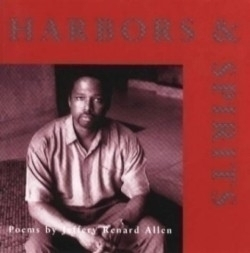Harbors and Spirits
“Singing ain’t easy,” Renard Allen insists in “Saws and Sayings,” the poem/preface of Harbors and Spirits. That poem also includes a key statement of purpose: “to draw the lines tight / gather all the stories …and weave them into a single poem.” The most remarkable aspect of this first book of poems is the range of stories and motifs from African-American history and life that it gathers into what is indeed, if not a single poem, a single and unified voice. Yet the “I” of these poems seems less a Sensitive Young Poet (Allen is in his mid-thirties) than an endlessly curious explorer, one who finds almost everything he encounters more interesting than his own little self.
“Beginnings” starts indeed with creation stories, gods and goddesses: Legba, Erzulie, Danbhalah We-Do. The names can be confusing, but the aim is not anthropology or folklore but the making of new songs and rhythms from the intersections of old stories and contemporary life. Tales of slavery and lynchings are interwoven, and more personal passages as well. The language is vivid and almost incantatory, moving with what is sometimes breathtaking speed and sureness through the short lines: “Iron beads in / side me. / I put my best nights on the table. / Toss my cup into the sea. Aflame / I set this stone. / There will be / milk in the morning / and bread.” (“Ewe”)
Later sections are also organized around external motifs: films and directors in part two, poets and musicians in part three. “Preview of America” suggests wittily that the horror movies of Wes Craven and Toby Hooper may have more than we think to tell us about our country. “Glass,” dedicated to David Cronenberg, ends on an even more unsettling variation on Emerson’s “Things are in the saddle, and ride mankind”: “The New Man / rides saddle- / deep in blood, / quick and powerful.”
Energetic, engaged and original, Allen’s poems work from the beautiful credo he attributes to the artist Romare Bearden: “Full to the knife, / the artist takes a bow, / bleeding / but not / bleeding death / If he says he owns / the work, / God will kill him.”
Disclosure: This article is not an endorsement, but a review. The publisher of this book provided free copies of the book to have their book reviewed by a professional reviewer. No fee was paid by the publisher for this review. Foreword Reviews only recommends books that we love. Foreword Magazine, Inc. is disclosing this in accordance with the Federal Trade Commission’s 16 CFR, Part 255.

